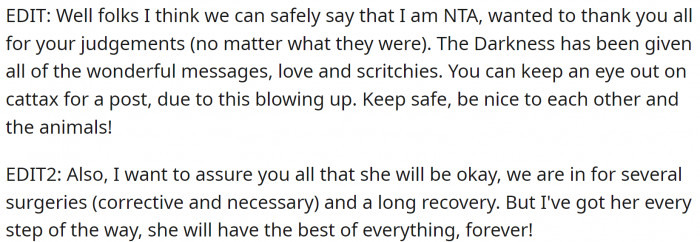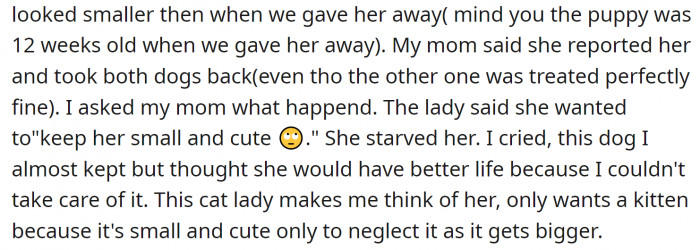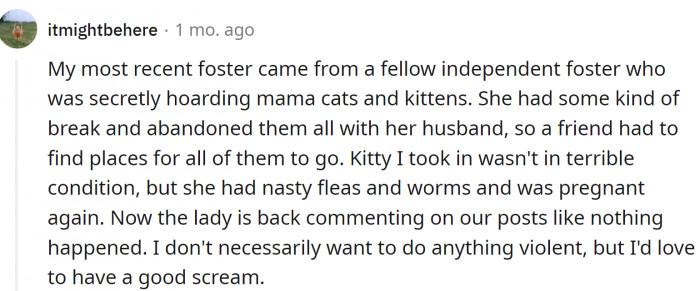Man Tells The Truth About How His Coworker Treats Her Animals To Prevent Her From Adopting Another Animal To Maltreat, Making Her A Pariah At Work
We have our jobs, schools, friends, family, romantic partners, etc. Our pets have only us.
And if you are not willing to take care of an animal and provide all the things it needs and deserves, get a plush toy. It will never grow up and doesn’t require care, food, or medicine.
A Reddit user going by the name u/8billionaliens posted a question: “AITA for telling our mutual friends the real reason I adopted a cat?” The story is interesting.
Namely, he adopted a cat to rescue it from being sent to a shelter. The cat’s owner (OP’s coworker) grew tired of it and wanted to discard it like a piece of trash.
OP took it into foster care but later decided to adopt it. He didn’t even ask for the cost participation that his coworker had promised him.
But when he heard that she was planning on adopting another kitten, he cracked and told two of his friends the truth about her way of keeping pets. The story spread pretty quickly, and the people at work turned their backs on her.
Now she is angry at OP. Is it his fault for speaking up in an effort to save some poor animal?
OP asks:

He agreed to foster a cat to prevent its owner from taking it to a shelter

The cat was in poor condition, and the owner (who happens to be OP's coworker) was more interested in drinking than taking care of it.

Understanding Animal Welfare and Human Behavior
The treatment of animals often reflects broader psychological principles related to empathy, attachment, and moral development. According to Dr. Daniel Goleman, an emotional intelligence expert, "A lack of empathy towards animals can indicate deeper issues with emotional regulation and interpersonal relationships." Developmental psychology suggests that nurturing behaviors towards pets can promote empathy in individuals, especially during childhood. As noted by Dr. Alison Gopnik, a developmental psychologist, "Children who engage positively with animals are more likely to develop a strong sense of compassion and responsibility, which can significantly influence their future relationships with both animals and people."
It turned out that the animal was sweet and well-behaved (despite what its owner said)

OP took it to the vet and started the healing process. He decided to keep the cat.

In the meantime, the previous owner sure did indulge herself. She spent money on her hair and nails and didn't think of contributing to the expenses OP had before he decided to keep the cat. OP was angry but didn't react until he heard her talking about adopting another kitten. That was the final straw.

It’s crucial to recognize that the decision to adopt pets should be rooted in a genuine commitment to their well-being. A clinical psychologist noted that some individuals may project their own needs onto animals, seeking companionship without fully considering the responsibilities that come with pet ownership. This phenomenon can lead to neglectful behaviors, as seen in cases where animals are adopted impulsively without a proper assessment of the adopter's lifestyle and resources.
Research indicates that a significant percentage of pet owners do not understand the long-term commitment involved, which can result in negative outcomes for both the pet and the owner. Education about animal care and the psychological implications of pet ownership can promote healthier relationships between humans and animals.
The truth spread like wildfire...

OP is taking great care of the cat, and it is finally happy and safe.

Not even a cactus...

The Role of Social Dynamics in Workplace Relationships
Workplace dynamics can significantly influence how individuals perceive and respond to their colleagues’ behaviors, particularly in sensitive matters like animal welfare. According to social psychology theories, such as Social Identity Theory, individuals often categorize themselves and others into groups, which can lead to in-group favoritism and out-group bias. A study conducted by Dr. Henri Tajfel and his colleagues illustrated how social categorization often impacts perceptions of morality and ethics, including attitudes toward animal treatment.
When someone speaks out about a colleague's unethical behavior, as seen in the Reddit scenario, it can create a pariah-like effect, where the whistleblower risks social isolation. This response highlights the importance of fostering a supportive work environment where ethical discussions can occur without fear of social repercussions, thereby encouraging a culture of accountability.
One Redditor shared a similar story:

Some people are simply heartless.

But, luckily, the dog is safe and happy now.

Experts in behavioral psychology emphasize the importance of empathy training in promoting responsible pet ownership. Research from the University of Pennsylvania indicates that empathy can be cultivated through structured programs that include elements of animal care education and emotional intelligence development.
Implementing workshops or seminars that focus on the responsibilities of animal ownership might foster a stronger sense of empathy and understanding among potential adopters. These programs can help prospective pet owners assess their capabilities and motivations, ensuring they are better prepared for the commitment involved in caring for an animal.
She needs a plush doll. That's it.

This is a good idea:

But OP had already thought of it:

The Psychological Impact of Animal Neglect
Animal neglect can have profound psychological implications, not only for the animals themselves but also for the individuals who engage in such behaviors. According to Dr. Ramani Durvasula, a clinical psychologist, "Neglecting pets often reflects deeper emotional struggles, such as unresolved trauma or anxiety." This perspective aligns with findings from various mental health experts who note that individuals who neglect animals may be grappling with significant personal issues. Dr. Jonathan Haidt, a social psychologist, emphasizes that "understanding the root causes of neglect can lead to more compassionate interventions." This suggests that individuals who lack the resources or emotional capacity to care for animals may need targeted psychological support rather than judgment. By fostering a deeper understanding of these issues, we can create a more supportive environment for both the individuals and the pets involved.
Shelters have these lists:

Sadly, this is true:

Bat counselling may be the best solution.

Additionally, fostering a culture of accountability in animal care can encourage responsible adoption practices among peers. Research from the University of Michigan suggests that peer influence plays a significant role in decision-making, especially in communal settings like workplaces. By encouraging open discussions about the challenges and responsibilities of pet ownership, coworkers can create a supportive network that holds each other accountable.
Implementing informal mentorship programs where experienced pet owners guide new adopters through the responsibilities can also promote a culture of empathy and care. Such initiatives can not only enhance individual understanding but also improve overall workplace morale and collaboration.
Redditors shared their experiences:

The important thing is to stop this woman from adopting any more kittens:

Redditors also wanted to help:

Promoting Positive Change through Community Engagement
Community engagement initiatives can be instrumental in changing attitudes towards animal welfare. As noted by Dr. Michael Thompson, a child psychologist, "When communities come together to support vulnerable populations, including animals, it fosters empathy and responsibility among individuals." This sentiment is echoed in various community-based programs that encourage active participation, leading to increased awareness of animal welfare issues. Creating awareness campaigns or volunteer opportunities related to animal care can help cultivate a sense of community responsibility and encourage individuals to reflect on their own behaviors towards pets. By fostering a community-oriented approach to animal welfare, we can promote more responsible and compassionate pet ownership practices.
Adopting a cat means you are willing to provide a home, care, and love to some poor animal. Unfortunately, some people only want to keep kittens because they are cute and small.
Also, they cost a lot less to take care of – they don’t eat as much and are generally healthier than older cats. They keep forgetting that these are living beings who will grow up.
And these living beings require constant care.
Psychological Analysis
The situation described highlights a crucial aspect of human behavior: the interplay between empathy and accountability. The coworker's neglect of her pet suggests a lack of emotional awareness or unresolved personal issues, which can lead to irresponsible behaviors, particularly in contexts like pet ownership where emotional investment is vital. Meanwhile, the whistleblower's decision to expose her reflects a strong moral motivation, driven by a desire to protect the vulnerable; yet it also risks social alienation, illustrating the complex dynamics of workplace relationships and ethical responsibility.
Analysis generated by AI
Analysis & Alternative Approaches
Ultimately, the treatment of animals is intricately tied to our psychological frameworks and social dynamics. Research shows that fostering empathy and understanding through education can significantly impact how individuals approach pet ownership and animal welfare. By encouraging open dialogues, promoting community engagement, and addressing the underlying psychological factors that contribute to neglect, we can create a more compassionate environment for both pets and their owners.
As we work towards promoting responsible animal care, integrating psychological insights and evidence-based practices will not only improve the lives of animals but also enhance our own emotional well-being and social cohesion.



